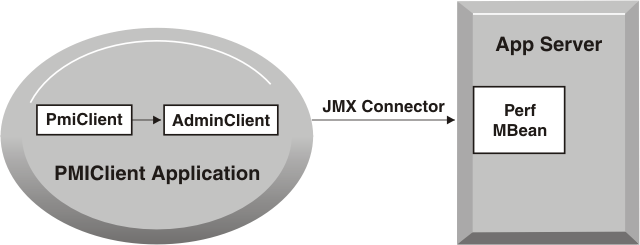
Use this page to learn how to use the PmiClient application and JMX connector to communicate to the Perf MBean in an application server.
A Performance Monitoring Infrastructure (PMI) client package provides a PmiClient wrapper class to deliver PMI data to a client. As shown in the following figure, the PmiClient API uses the AdminClient API to communicate to the Perf MBean in an application server.
The PmiClient communicates with the network manager first, retrieving an AdminClient instance to each application server. When the PmiClient receives the instance, it uses it to communicate with the application server directly for performance or level setting changes. Since level settings are persistent through PmiClient, you are only required to set it once, unless you want to change it.
Performance Monitoring Infrastructure and Java Management Extensions The PmiClient API does not work if the Java Management Extensions (JMX) infrastructure and Perf MBean are not running. If you prefer to use the AdminClient API directly to retrieve PMI data, you still have a dependency on the JMX infrastructure.
When using the PmiClient API, you have to pass the JMX connector protocol and port number to instantiate an object of the PmiClient. Once you get a PmiClient object, you can call its methods to list nodes, servers and MBeans, set the monitoring level, and retrieve PMI data.
The PmiClient API creates an instance of the AdminClient API and delegates your requests to the AdminClient API. The AdminClient API uses the JMX connector to communicate with the Perf MBean in the corresponding server and then returns the data to the PmiClient,
which returns the data to the client.

Related tasks
Running your new monitoring applications
Searchable topic ID: rprf_pmijmx